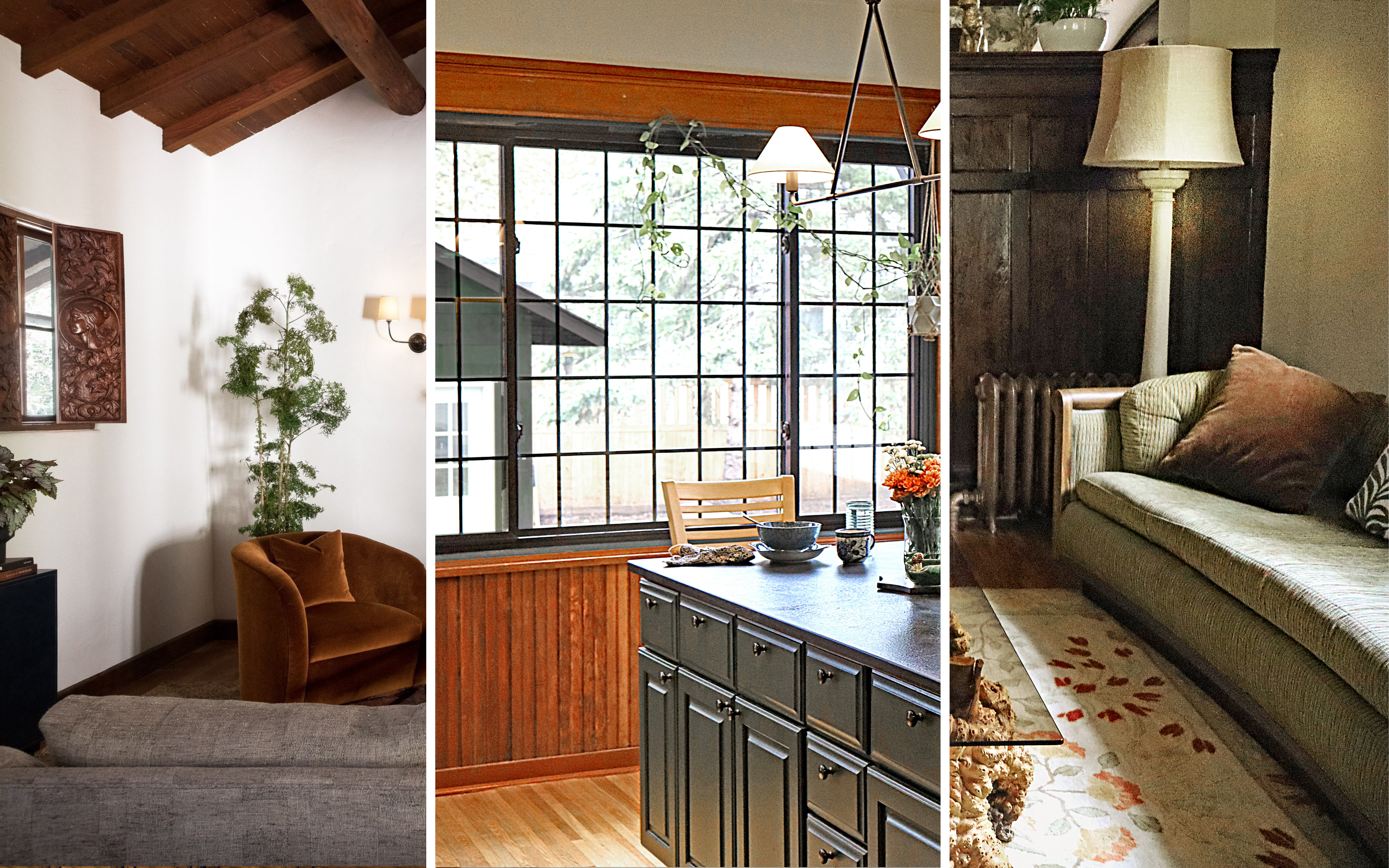How to clean blinds – expert ways to make them pristine
Find out how to clean blinds quickly and simply to keep them dust-free


Design expertise in your inbox – from inspiring decorating ideas and beautiful celebrity homes to practical gardening advice and shopping round-ups.
You are now subscribed
Your newsletter sign-up was successful
Want to add more newsletters?

Twice a week
Homes&Gardens
The ultimate interior design resource from the world's leading experts - discover inspiring decorating ideas, color scheming know-how, garden inspiration and shopping expertise.

Once a week
In The Loop from Next In Design
Members of the Next in Design Circle will receive In the Loop, our weekly email filled with trade news, names to know and spotlight moments. Together we’re building a brighter design future.

Twice a week
Cucina
Whether you’re passionate about hosting exquisite dinners, experimenting with culinary trends, or perfecting your kitchen's design with timeless elegance and innovative functionality, this newsletter is here to inspire
Knowing how to clean blinds easily is essential knowhow. It’s inevitable they’ll gather dust in the course of everyday life and an accumulation is neither good for the health of a home’s occupants nor the look of the room.
The best way to clean blinds will depend to some extent on their type but the basic technique is as easy to master as that for cleaning upholstery and you’ll just need a few supplies.
Our guide will give you the lowdown, and we’ve asked the experts to share their methods, too.
How to clean blinds
‘Although many of us will remember to clean our windows regularly, cleaning the window coverings that protect our windows can often slip our minds,’ says Yvonne Keal, product manager at Hillarys. How to clean blinds? Just like cleaning curtains, it depends on what they’re made from and these cleaning tips cover every type.
How to clean horizontal and vertical blinds
Horizontal blinds should be fully lowered before you start and vertical blinds extended across the window.
‘Begin by using a vacuum cleaner to remove loose dust,’ advises Vera Peterson, president of Molly Maid, a Neighborly company. ‘Vacuums come with several attachments – there are even accessories specifically made for mini blinds. Use the upholstery tool to brush and vacuum the blinds. Move the brush parallel to the blinds, not against. If you’re cleaning vertical blinds, only wipe downwards.
‘Follow up with a damp microfiber rag to remove as much dust as possible. Blinds that are in the kitchen may be greasy. If this is the case, wipe the blinds down with soapy water.’
Design expertise in your inbox – from inspiring decorating ideas and beautiful celebrity homes to practical gardening advice and shopping round-ups.
A microfiber towel grabs on to the dust, explains Catherine Cabano, founder of holistic health consultancy In On Around. ‘It's important to avoid making the dust airborne, otherwise, you could breathe it in,’ she explains.
How to clean wood blinds
To clean wooden blinds, close the slats and wipe with a microfiber cloth. ‘Make sure to wipe in a downwards motion so you don't disturb the positioning of the slats,’ says Yvonne Keal. A specialist blind cleaning tool could be used, she suggests – we like the HIWARE window blind cleaner.
Be aware that blinds made from wood shouldn’t be saturated with water. ‘If there is a lot of dust buildup, dip a clean rag into white vinegar and wipe the blinds,’ recommends Vera Peterson. ‘Once dry, use a spray-on furniture polish with lemon oil to restore the appearance of the blinds.’
Deep cleaning blinds made from wood that have a varnish or paint finish? ‘Rub lightly with a damp cloth until the stain disappears,’ says Yvonne Keal. ‘Try not to rub too hard as the varnish or paint on your wooden blind may be affected.’
How to clean metal and vinyl blinds
To clean blinds made from metal and vinyl that are in need of a thorough job, it’s worth taking them down and using the bathtub. Do check the manufacturer’s guidance first, though.
‘To start with, put a towel or rubber mat into the tub, to prevent any scratching,’ says Yvonne Keal. ‘Fill the bath with enough lukewarm water to completely cover the blind, and then add a mild detergent. Using a non-abrasive sponge, gently clean each slat until the stains begin to loosen. Once every slat is clean, rinse the blind thoroughly with cold water and hang it over the shower rail to air dry.’
How to clean fabric blinds
Roller shades can be very easy to clean. ‘All you need to do is roll your blind down fully and use your vacuum’s upholstery tool to gently remove any dust or dirt,’ says Yvonne Keal. ‘If you want a deeper clean, wipe in a downward motion from top to bottom using a damp and clean cloth. Remember to let your blind dry out fully before putting it back up to prevent bad smells or mold manifesting on your window covering.
‘Sometimes condensation on windows can mean mold starts to grow on blinds, as the nasty buildup thrives in warm and damp conditions,’ she continues. ‘Mold can be difficult to clean, however, it is possible to remove with the right technique. Pick up some fabric detergent formulated for killing spores and using a stiff brush, gently brush patches on the areas containing mold. Leaving your blind to air dry after cleaning can help prevent further outbreaks.’
If you aren’t able to clean fabric blinds yourself, taking them to a dry cleaner could be the answer.
How do professionals clean blinds?
Professionals recommend using a vacuum cleaner to clean blinds. ‘You could use an ultrasonic cleaner on your cellular blinds and sponge down your vinyl vertical blinds, or you could make your life easy and go with vacuuming – the one cleaning method that’s safe for virtually all treatments, from Roman, solar and pleated shades to blinds of any kind,’ says Julia Dorn, executive director new product development for Graber. ‘Just pop an upholstery or brush attachment on to your vacuum hose and go.’
Cleaning expert Tricia Holderman, owner, president and CEO of Elite Facility Systems and the author of Germinator: The Germ Girl’s Guide To Simple Solutions In A Germ-Filled World, agrees. ‘We are currently using small vacuums with a brush attachment to remove dust. Most of the time, that is all that is needed,’ she says.
Do dryer sheets clean blinds?
Dryer sheets can be used to clean blinds, so you might want to make space to stash enough to do this task as well as for other tumble drying when you plan laundry room ideas. ‘Dryer sheets are a good alternative to using a microfiber cloth if you don’t have one readily available,’ say Derek Chiu and Leslie Tam, co-founders and directors of UrbanMop. ‘They are great at effectively getting dust off blinds and are a great substitute.’
Running a used dryer sheet over clean blind slats can also help keep them dust-free for longer, repelling a fresh covering, says Vera Peterson. Pay attention to your furnace, too. ‘Forced air from furnaces, air conditioning and open windows move dust, pet hair and more around homes with gusto,’ she explains. ‘Mark your calendar every three months to change your furnace filter, which will reduce the amount of airborne debris.’

Sarah is a freelance journalist and editor. Previously executive editor of Ideal Home, she’s specialized in interiors, property and gardens for over 20 years, and covers interior design, house design, gardens, and cleaning and organizing a home for Homes & Gardens. She’s written for websites, including Houzz, Channel 4’s flagship website, 4Homes, and Future’s T3; national newspapers, including The Guardian; and magazines including Future’s Country Homes & Interiors, Homebuilding & Renovating, Period Living, and Style at Home, as well as House Beautiful, Good Homes, Grand Designs, Homes & Antiques, LandLove and The English Home among others. It’s no big surprise that she likes to put what she writes about into practice, and is a serial house renovator.
-
 What to Do With Roses in February – 4 Tasks to Guarantee an Outstanding Display of Flowers This Summer
What to Do With Roses in February – 4 Tasks to Guarantee an Outstanding Display of Flowers This SummerFebruary is a time for planting new roses and looking after existing ones
-
 If Your Old Vacuum Is Too Heavy, This Light Cordless Dyson Doesn't Compromise on Powerful Suction – Now with Rare $190 Off
If Your Old Vacuum Is Too Heavy, This Light Cordless Dyson Doesn't Compromise on Powerful Suction – Now with Rare $190 OffDust, debris, hair – the Dyson V11 has no issues cleaning household mess and weighs less than half the weight of a top corded vacuum
-
 This once-dated style is making an unexpected comeback – it's where classic comfort meets refined elegance
This once-dated style is making an unexpected comeback – it's where classic comfort meets refined eleganceDespite a heavy focus on functionality, Mission-style interiors offer an understated charm using clean lines, simple forms, and natural materials
-
 What are the best Sherwin-Williams white paints? 6 favorite shades amongst interior designers
What are the best Sherwin-Williams white paints? 6 favorite shades amongst interior designersFrom classic whites to warm whites, these are the most loved Sherwin-Williams white paints
-
 Studio McGee and Kohler have curated a collection of 'clean, classic, and curated' kitchen and bathroom accessories
Studio McGee and Kohler have curated a collection of 'clean, classic, and curated' kitchen and bathroom accessoriesThese six collections – featuring luxury faucets, vanities, and light fixtures – include all the high-end upgrades your space needs
-
 What is Scandinavian interior design? Experts explain its beauty and functionality
What is Scandinavian interior design? Experts explain its beauty and functionalityFall for the clean lines, uncluttered spaces and natural materials of Scandinavian interior design
-
 5 Scandinavian dining room ideas for a simplistic yet refined scheme
5 Scandinavian dining room ideas for a simplistic yet refined schemeA Scandinavian dining room pairs clean lines with wood tones and shades of white. Here, interior designers share their favorite Scandinavian schemes
-
 How designers decorate with Benjamin Moore's White Dove – a 'clean and classic' bestselling white paint
How designers decorate with Benjamin Moore's White Dove – a 'clean and classic' bestselling white paintBenjamin Moore's top-selling shade White Dove is a favorite among designers for its warm undertones and design versatility
-
 5 'quiet luxury' bedrooms that look expensive – decorate with this year's must-have trend
5 'quiet luxury' bedrooms that look expensive – decorate with this year's must-have trendQuiet your bedroom – and mind – with these expert-approved 'palette cleanser' decorating recommendations for your sleep space
-
 7 'quiet luxury' living rooms that look expensive – decorate with 2023's must-have interior and lifestyle trend
7 'quiet luxury' living rooms that look expensive – decorate with 2023's must-have interior and lifestyle trendQuiet your home – and mind – with these expert-approved 'palette cleanser' decorating recommendations